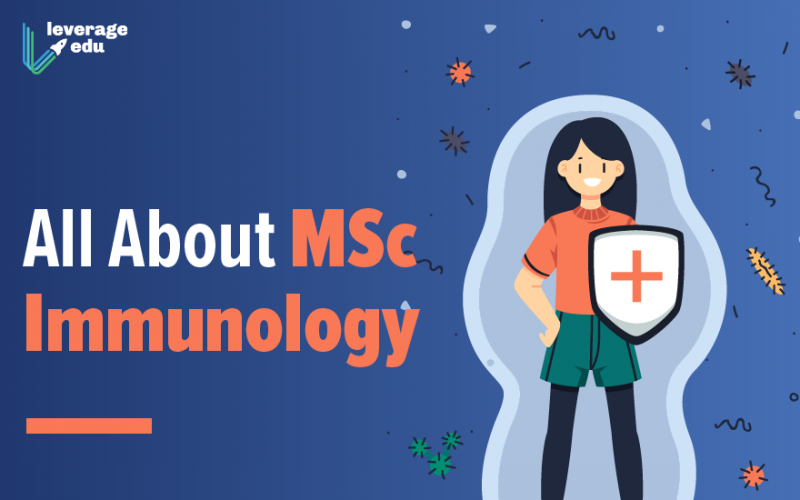Immunology is a discipline of biology that studies the human body’s defence mechanisms. Immunology has a wide range of applications in biological sciences, including virology, organ transplantation, dermatology, cancer, parasitology, and bacteriology. After completion of this course, a graduate can work as a researcher or a clinician, assisting in the diagnosis and treatment of autoimmune illnesses, allergies, and other diseases. Let’s explore MSc in Immunology, eligibility criteria, application process and more.
Highlights
| Course level | Masters |
| Duration | 1-2 years |
| Examination Type | Semester based |
| Admission process | Merit/Entrance |
| Fees | INR 50,000 to INR 15,00,000 |
| Average Salary | INR 5 LPA to INR 7 LPA |
About MSc in Immunology
An overview of this course would include workshop management, clinical practices, general health education, and so on. Mechanical operations and working, functional anatomy of the body, clinics, general health education, and more.
Syllabus
- Basic Immunology
- Cell & Molecular Biology
- Stem Cell Immunology & Gene Therapy
- Recombinant DNA Technology & Tissue Culture
- Basic Immunology, Cell & Molecular Biology.
- Stem Cell Immunology & Gene Therapy, Tissue
- Culture, Recombinant DNA Technology
- Clinical Immunology & Immunohematology
- Infection & Immunity
- Basic & Clinical Biochemistry
- Genomics & Proteomics
- Clinical Immunology, Immuno-hematology and
- Infection & Immunity
- Basic & Clinical Biochemistry,
- Genomics & Proteomics
- Immune-regulation & cytokines
- Advanced Immunology
- Immunological Technique & Methodology
- Biostatistics & Computer Application in Biology
- Immunological Disease Management
Top Universities for MSc in Immunology Abroad
| Colleges | Location | Fees |
| University of Glasgow | Glasgow, Scotland | INR 24,17,621 (full time) |
| University of Ottawa | Ottawa, Canada | INR 20,90,555 (full time) |
| Trinity College | Dublin, Ireland | INR 19,60,168 (full time) |
| University of Birmingham | Birmingham, England | INR 19,20,479 (full time) |
| Cardiff University | Cardiff, Wales | INR 17,65,00 (full time) |
Eligibility for MSc in Immunology
- To be eligible for master’s immunology courses, candidates must have finished their bachelor’s degree in immunology with a grade of at least 50%.
- Certain colleges also admit students on the basis of merit, taking into account their CGPA or graduation percentage.
- Students must pass an entrance exam to be regarded as eligible for admission to institutes that have one.
Also Read: MSc Genetics
Application Process
The application process takes place over a period of time and begins months before the commencement of classes. The universities have two main intakes known as the fall intake and winter intake for international students to kickstart their journey. You can call our Leverage Edu experts on 1800 572 000 to find out how the application process can be fast-tracked. Here’s an easy 5-step process to complete your application process:
- Call our experts on 1800 572 000 to shortlist your favourite universities and courses. Start your application to multiple universities through our one dashboard platform
- Compile all your documents like SOPs, essays, certificates and LORs and exam scores like IELTS, TOEFL, GRE, GMAT, etc
- Meet all the applications deadlines and start the application process for accommodation, students visa, and scholarships/student loans
- Accept the offer letter and meet your teachers, college mates and roommates virtually
- Get your visa approved and fly to your dream university!\
Career Scope after MSc in Immunology
Graduates in this discipline can find a variety of jobs at both government and private facilities. In addition, you can work as a visiting immunologist in a variety of hospitals. Students pursuing a doctorate can get high-paying jobs in private hospitals based on their experience. You can also pursue a profession as a university or college professor. Since research takes up the majority of their time, it is the most significant part of immunology. Immunologists work in biomedical research, healthcare, agriculture, and environmental monitoring, among other fields. Immunology requires a PhD to pursue a career in scientific research. This course prepares students for jobs in molecular biology, diagnostics, biotechnology and regulation, and infectious disease research related to immune-based pathology.
| Job Profiles | Average Salary |
| R&D Specialist | INR 10,00,000 LPA |
| Program Manager | INR 7,00,000 LPA |
| Medical and Clinical Laboratory Technologists | INR 4,00,000 LPA |
| Epidemiologist | INR 5,25,000 LPA |
| Veterinarian | INR 9,00,000 LPA |
| Neuro Immunologist | INR 6,50,000 LPA |
FAQs
Yes, you can do MSc Immunology after BSc Microbiology. In some colleges and universities, you can even opt for MSc in Immunology along with Microbiology.
Attending a four-year bachelor’s degree programme and graduating with a degree in a related field is the first step toward becoming an immunologist. Pre-medicine, biology, public health, nursing, and biochemistry are all good choices for aspiring immunologists.
Immunologists are research scientists or practising professionals who investigate, assess, and/or treat disease processes involving the immune system. Immunology is a discipline of medicine that deals with disease immunity.
Are you planning to study MSc in Immunology but not sure where to start from? Call our Leverage Edu experts at 1800 572 000 for end-to-end guidance from application to Visa process.

 One app for all your study abroad needs
One app for all your study abroad needs






















 45,000+ students trusted us with their dreams. Take the first step today!
45,000+ students trusted us with their dreams. Take the first step today!


